#celtic polytheism
Text
“Paganism is dead”
No man it’s just not organized and that’s the way it should be, creating a monoculture for paganism is potentially extremely dangerous to its themes of individualism and personal practices . Yeah we don’t have temples or pilgrimages but that’s because the grace of the natural world/ our deities can be found anywhere and everywhere we don’t need temples our own bodies are pagan temples. Our own flesh and bones are structures of divinity to us, we make altars in our houses and make those our blessed places. Most of paganism is heavily private of course you think it’s dead that and anytime western culture is faced with a polytheistic system it has an absolute hissy fit.
#pagan#european paganism#paganism#witch#nature#altar#celtic polytheism#hellenic polytheism#norse polytheism#greek polytheism
2K notes
·
View notes
Text
Sometimes I approach my shrines and just sort of stand there. Like, I don't pray, make offerings, or anything. I'll just stand there and look at it. Or sit next to it.
For a while, this made me feel strange and a little guilty, even. But now I look to how I do similarly with my parents. I'll just go and sit quietly with them, or go lean on them. Just take comfort in their presence.
The Gods ARE our divine parents, after all.
#hellenic deities#hellenic polytheism#pagan#hellenismos#greek polytheism#hellenic gods#altar#irish paganism#polytheism#irish mythology#celtic paganism#celtic polytheism
462 notes
·
View notes
Text
Our deities love and care for us so much remember that especially when you feel distant from them not only is that emotion normal but they understand. The gods are here for us through hardship even when you don't think they are
#hellenic paganism#deity work#paganism#hellenic polytheism#pagan#hellenic deities#greek gods#helpol#hellenic pagan#celtic polytheism
541 notes
·
View notes
Text
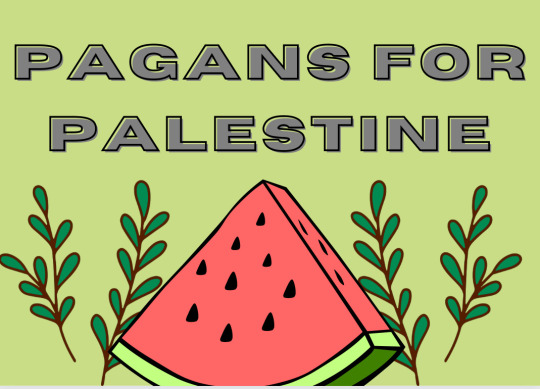
Solidarity between all religions, especially between those threatened by colonialism! Pagans, polytheists, and witches of all creeds unite for Palestine!
Share:
Prayers
Offerings
Protest posters
Spells
News
Donations
And other symbols of solidarity colored by your faith!
Never before in history had we the tools for everyone, all over the world, to resist genocide simultaneously and with such fierceness. Everything you do to keep eyes on Gaza counts. Every prayer, every action, it all amounts to something grander.
Keep talking about Israel’s genocidal, colonialist ‘war’ against Palestine. Keep praying. The divine are with us.
#mine#pagans for Palestine#paganism#hellenic polytheism#norse polytheism#kemetic polytheism#celtic polytheism#christian witch#jewish witch#wicca#polytheism#witchcraft
348 notes
·
View notes
Text
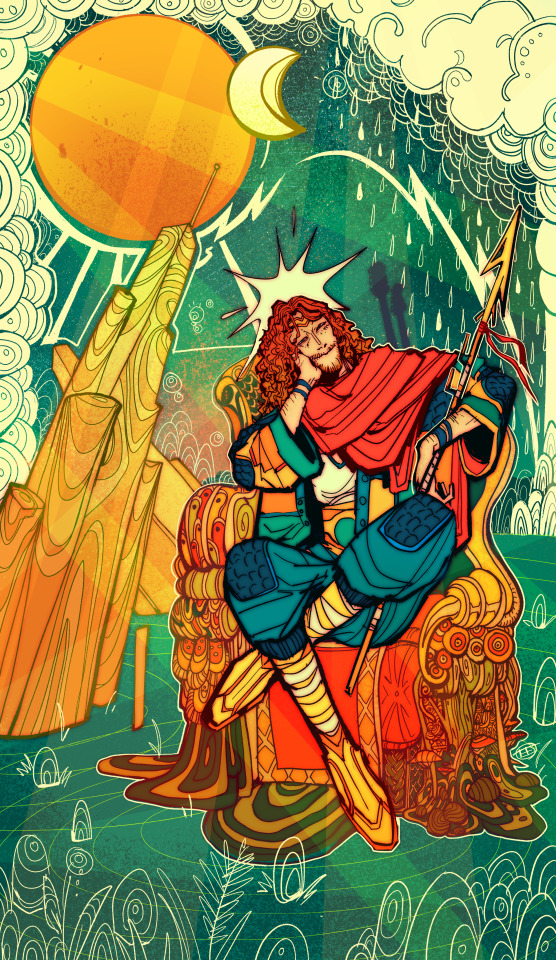
Been wanting to make more work based on Irish paganism and its stories (sort of a blending of jobs hahaha), so I started with an obvious option for me.
Lugh, master of many skills! The "many skills" bit comes in handy for work and an endless sea of special interests, for sure.
#lugh#lugh deity#irish paganism#celtic polytheism#irish polytheism#polytheism#deity work#paganism#illustration#digital art#doodles
535 notes
·
View notes
Text
Important Facts about Samhain from an Irish Celtic Reconstructionist
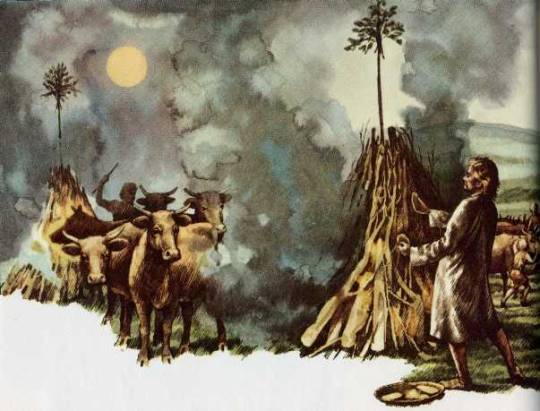
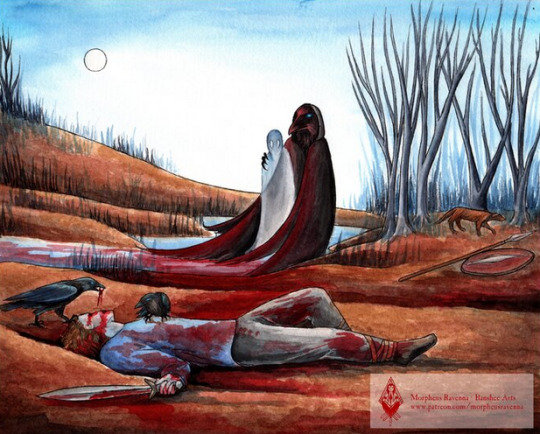
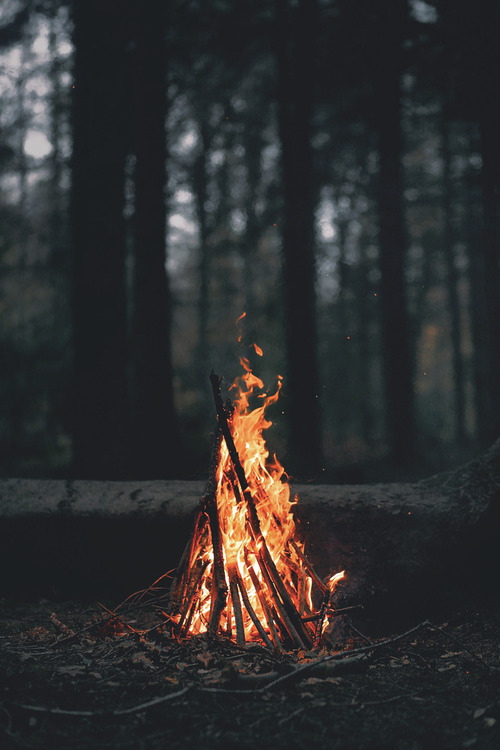
Pronunciation
SOW-in or SOW-een ~NOT~ Sam-han, Sam-win etc.
Dates
Most reconstructionists celebrate Samhain on Oct 31-Nov 1, however some may choose to celebrate on Gregorian Nov 13-14 as this would match the Julian dates of Oct 31-Nov 1. Some also believe that it was a three day festival spanning Oct 31- Nov 2 on which Nov 2 is specifically devoted to ancestral veneration, but there is no specific evidence of this, only possible extrapolation from more modern practices.
Following the Celtic method of days beginning at sunset, regardless of the specific dates you choose to celebrate on your festivities should begin at sunset and end at sunset.
Importance in the Mythos
Ná Morrighan has a strong connection to this time of year thanks to the story of Cath Dédenach Maige Tuired (The Last Battle of Mag Tuired) in which she is found depicted as the ‘Washing Woman’ (sometimes washing herself in the river and other times washing the bloodied armor of the soldiers that would die that day), on the eve of the battle which is also Samhain. The Dagda approaches her and couples with her (creating the ‘Bed of the Couples’ along the bank of river and granting Dagda her blessing in the battle to come). This encounter seems to over emphasize the liminality of the encounter by taking place during the changing of the year and with the couple each standing with ‘one foot on either bank’ of the river.
She and her sisters (Badb and Macha) then use various forms of magic to rain destruction on their enemies (in the form of fire and blood). After the day is won Morrighan speaks a prophecy that describes what is taken by some to be the end of days and others to be the events which will later lead to the Ulster Cycle.
Beneath the peaceful heavens lies the land.
It rests beneath the bowl of the bright sky.
The land lies, itself a dish, a cup of honeyed strength, there, for the taking, offering strength to each
There it lies, the splendour of the land.
The land is like a mead worth the brewing, worth the drinking.
It stores for us the gifts of summer even in winter.
It protects and armours us, a spear upon a shield
Here we can make for ourselves strong places, the fist holding the shield
Here we can build safe places, our spear-bristling enclosures.
This is where we will turn the earth. This is where we will stay.
And here will our children live to the third of three generations
Here there will be a forest point of field fences
The horn counting of many cows
And the encircling of many fields
There will be sheltering trees
So fodderful of beech mast that the trees themselves will be weary with the weight.
In this land will come abundance bringing:
Wealth for our children
Every boy a warrior,
Every watch dog, warrior-fierce
The wood of every tree, spear-worthy
The fire from every stone a molten spear-stream
Every stone a firm foundation
Every field full of cows
Every cow calf-fertile
Our land shall be rich with banks in birdsong
Grey deer before Spring
And fruitful Autumns
The plain shall be thronged from the hills to the shore.
Full and fertile.
And as time runs its sharp and shadowy journey, this shall be true.
This shall be the story of the land and its people
We shall have peace beneath the heavens.
Forever
(based on the translation by Isolde Carmody)
It is also mentioned in Echtra Cormaic that on this festival every seven years the high king would host a feast, it was at this time new laws could be enacted. (but it seems that individual Tuathas or possibly kings of the individual providence may have done this for their territories at Lughnasadh).
It seems to be a time considered especially susceptible to (or of) great change as it is the time which the Tuatha de Danann win victory over the Formorians and take control of Ireland, the invasion of Ulster takes place at this time in Táin bo Cúailnge, in Aislinge Óengusa Óengus and his bride-to-be are changed from bird to human and eventually he claims kingship of Brú na Bóinne at this time of year.
Celebration Traditions
Samhain is the beginning of the “dark half” of the year and is widely regarded as the Insular Celtic equivalent of the New Year. The “dark half” of the year was a time for story telling, in fact in this half of the year after dark is considered the only acceptable time to tell stories from the mythological and Ulster cycle (the Fenian cycle being assumed to be no older than the 12th century based on linguistic dating). Traditionally anything that had not been harvested or gathered by the time of this festival was to be left, as it now belonged to the Fae (in some areas specifically the Púca).
This was also an important time for warding off ill luck in the coming year. Large bonfires would be built and as the cattle were driven back into the community from the pastures they would be walked between these bonfires as a method of purification (the reverse custom of Bealtaine where the livestock were walked between the fires on their way out to the summer pastures). Assumed ritualistic slaughter of some of the herd would follow (though this perhaps had the more practical purpose of thinning the herd before the winter and creating enough food for the feasting). In some areas the ashes from these fires would be worn, thrown or spread as a further way to ward off evil.
Homes would be ritualistically protected from the Aos Sí (Fae or ‘Spirits’) through methods such as offerings of food (generally leaving some of the feasting outside for them), carving turnips with scary faces to warn them off (we now tend to do this with gourds), and smoke cleansing the home (in Scottish saining) traditionally with juniper, but perhaps rowan or birch might be an acceptable alternative. It is likely these would be part of the components used in Samhain bonfires as well, for the same reason.
Lastly based on later traditions as well as links in the mythology this is a time where divination practices or those with the ‘second sight’ were regarded to be especially potent.
Art Credit @morpheus-ravenna
#samhain#irish#irish mythology#irish polytheism#irish paganism#celtic reconstructionism#celtic paganism#celtic polytheism#na morrigna#the morrígan#the dagda#fire festival#blackcrowing#Irish reconstructionist
446 notes
·
View notes
Text

Grianstad shona daoibh!
In Ireland, the Winter Solstice is often associated with the Newgrange passage tomb in County Meath. Each year, as the sun rises on the Solstice, it aligns perfectly with tomb to illuminate the passage within.
Lots of historical, scientific and even crazy (I’m looking at you Ancient Aliens) theories exist as to why this occurs, but there is also some stories within our mythology associated with the event, including the Dagda’s affair with the Goddess Boann.
The Dagda was thought to be an Irish god of fertility and strength. A wife of one of his aides, Boann, a goddess of the River Boyne, was particularly entranced, and the couple soon began a clandestine affair. Affairs don’t stay secret when a god of fertility is involved, and Boann quickly fell pregnant around springtime.
Boann resided at Newgrange, and when her husband left for a hunting trip, the Dagda cast a spell to make the sun standstill for nine months and pause time. Boann carried her baby to term and eventually gave birth to Aengus, a god of youth and love. Despite it now being Winter, on Elcmar’s return he felt as if only a day had passed and the affair went unnoticed. That is until one day, when an adult Aengus would eventually arrive to duel Elcmar for Newgrange, which he deemed his birthright.
#irish mythology#artists on tumblr#irish folklore#newgrange#winter solstice#aengus#the Dagda#Boann#celtic polytheism#amylouioc art#my art#celtic mythology#fantasy illustration
235 notes
·
View notes
Text
I love u tumblr pagans I love u polytheists I love u deity devotees I love u all and this niche little community we've created for ourselves
I love that the same love people have been experiencing for their deities for hundreds and hundreds of years moves through us
I love that we are all part of the gods and they are part of us and we are all part of each other
I love all of you and how we love
Love love love u ❤️
#hellenic pantheon#hellenic polytheism#hellenic gods#hellenic polytheist#hellenic pagan#hellenic paganism#helpol#hellenic polytheist community#norse paganism#celtic paganism#norse polytheism#celtic polytheism#polytheism#roman polytheism#paganism#paganblr#witchbr#deity worship#deity witchcraft#deity work#deity devotion
346 notes
·
View notes
Text
sometimes my devotion for the day is “I’m gonna work out for nearly two hours and really push myself in honor of The Morrigan to be a better, braver, stronger warrior for Her” and sometimes it’s “I’m gonna get this black raspberry and dark chocolate truffle ice cream for Hades because I think He’d like it” and sometimes it’s just “I’m gonna light this incense for Hermes because I’m exhausted but He deserves it” and you know what? it’s all devotion. it’s all love. it’s all worship. it’s all worthy and appreciated. nothing is too small or not enough*. doing what you can do is what matters.
*unless for some reason or another you’ve promised something specific to a deity, in which case ymmv. I’ve had situations like that where I fell through on a promise and I felt my relationship suffered, I’ve also had situations where I fell through and the only real negative was feeling like I hadn’t done enough for my own standards. in this post I’m specifically addressing scenarios in which there is no predesigned promise of devotion.
#the wolf speaks#paganblr#pagan#devotion#deity devotion#deity worship#deity work#helpol#hellenic pagan#hellenic worship#hellenic paganism#hellenic polytheism#celtic pagan#celtic paganism#celtic polytheism
73 notes
·
View notes
Text
I had a dream where I met a God with moving tattoos all over his body. The tattoos were of various animals, forever prancing around in circles. An infinite hunt.
I just can't get that image out of my head. It was so breath taking. It's so humbling to 'see' such a thing.
It reminds me how the gods are so much more than what we just perceive them as, y'know?
#paganblr#celtic pagan#paganism#celtic polytheism#pagan#hellenic paganism#norse paganism#kemetic paganism#nordic polytheism#hellenic polytheism#kemetic polytheism#dream
66 notes
·
View notes
Text
Something that gets left out in some eclectic discussions of the celtic fire festivals is that they are the end of one season and the start of another
Imbolg- Start of Spring
Bealtaine- Start of Summer
Lúnasa- Start of Autumn
Samhain- Start of Winter
Which makes sense because in Ireland the seasons are generally defined as:
Spring – February, March, April
Summer – May, June, July
Autumn – August, September, October
Winter – November, December, January
Like if you went up to a random person in Ireland today and asked them what season February is in they’d say Spring.
Seasons are obviously different across the world, in fact many places don’t have 4 seasons so the misunderstanding makes sense but seeing people frame Imbolc as “Oh its not a spring festival its the just bringing back of light” is just factually wrong.
#féile#irish paganism#gaelic paganism#celtic paganism#Irish polytheism#gaelic polytheism#celtic polytheism#gaelpol#iripol#witch#I think other places use the solstaces/equinoxes?#this is a weirdly common thing tho#magic#ireland#mine#witchblr
212 notes
·
View notes
Text
UNBLENDING CELTIC POLYTHEISTIC PRACTICES
Celtic Umbrella
This lesson is largely focusing on the insular Celtic nations & Brittany (Ireland/Eire, Scotland/Alba, Wales/Cymru, Cornwall/Kernow, Isle of Man/Mannin, & Brittany/Breizh) - traditionally regarded as 6 out of the 7 Celtic nations. Galicia/Galizia is the 7th, but because of a mix of the below + my own lack of knowledge, I won't be covering them.
The vast swath of Continental Celtic cultures are a different but equally complex topic thanks to extinction, revival, varying archaeological artefacts and the work of modern practioners to piece unknown parts back together.
This will serve as a quick 'n' dirty guide to the insular Celtic nations, Celtic as a label, blood percentages and ancestry, the whats and whys of "Celtic soup", and how to unblend practice.
The insular Celtic groups are split into two language groups: Brythonic languages and Gaelic languages.
Brythonic languages are Cymraeg/Welsh, Kernewek/Cornish, & Breton
Gaelic languages are Gàidhlig/Scottish, Gaeilge/Irish, & Gaelg/Manx.
The language split leads to certain folkloric and religious figures & elements being more common within the language group than without. All of these nations had historic cultural exchange and trade routes via the Celtic sea (and beyond). Despite this, it is still important to respect each as a home to distinct mythologies.
Pros/Cons of a broad Celtic umbrella
Pros
- Used within celtic nations to build solidarity
- Relates to a set of cultures that have historic cultural exchange & broad shared experiences
- A historic group category
- Celtic nations’ culture is often protected under broad legislation that explicitly highlights its ‘Celtic-ness’.
Cons
- Can be used reductively (in academia & layman uses)
- Often gives in to the dual threat of romanticisation/fetishisation & erasure
- Conflates a lot of disparate practices under one banner
- Can lead to centring ‘celtic american’ experiences.
- Celtic as a broad ancestral category (along with associated symbols) has also been co-opted by white supremacist organisations.
In this I’m using ‘Celtic’ as a broad umbrella for the multiple pantheons! This isn’t ideal for specifics, but it is the fastest way to refer to the various pantheons of deities that’ll be referenced within this Q&A (& something that I use as a self identifier alongside Cornish).
What about blood % or ancestry?
A blood percentage or claimed Celtic ancestry is NOT a requirement to be a follower of any of the Celtic pantheons. The assumption that it does or is needed to disclose can feed easily into white supremacist narratives and rhetoric, along side the insidious implications that a white person in the USA with (perceived or real) Celtic ancestry is 'more celtic' than a person of colour living in a Celtic region (along with other romanticised notions of homogenously white cultures).
Along side this, a blood percentage or distant ancestry does not impart the culture and values of the Celtic region or it's recorded pagan practices by itself. Folk traditions are often passed down within families, but blood percentage is not a primary factor within this.
Connecting with ancestry is fine, good, and can be a fulfilling experience. It stops being beneficial when it leads to speaking over people with lived experiences & centres the USA-based published and authors - which can lead to blending/souping for reasons further on.
What is 'soup'?
Celtic soup is a semi-playful term coined by several polytheists (primarily aigeannagusacair on wordpress) to describe the phenomenon of conflating & combining all the separate pantheons and practices from the (mainly) insular Celtic nations into one singular practice - removing a lot of the regionalised folklore, associated mythos, & varying nuances of the nations that make up the soup.
Why does it happen?
The quick version of this is book trends and publishing meeting romanticisation and exotification of Celtic cultures (especially when mixed with pre-lapsarian views of the Nations). It's miles easier to sell a very generally titled book with a lot of Ireland and a little of everywhere else than it is to write, source and publish a separate book on each.
This is where centering American publishers and authors becomes an issue - the popular trend of USA-based pagan publications to conflate all celtic nations makes it hard to find information on, for example, Mannin practices because of the USA’s tendency to dominate media. Think of Llewellyn’s “Celtic Wisdom” series of books.
It has also been furthered by 'quick research guides'/TL;DR style posts based on the above (which have gained particular momentum on tumblr).
The things that have hindered the process in unblending/"de souping" is the difficulty in preserving independently published pamphlets/books from various nations (often more regionalised and immediately local than large, sweeping books generalising multiple practices) along with the difficulty of accessing historic resources via academic gatekeeping.
All of this has lead to a lack of awareness of the fact there is no, one, singular Celtic religion, practice or pantheon.
Why should I de-soup or unblend my practice?
Respecting the deities
It is, by and large, considered the bare minimum to understand and research a deity's origin and roots. The conflation of all insular Celtic deities under one singular unified pantheon can divorce them from their original cultures and contexts - the direct opposite to understanding and researching.
Folklore and myth surrounding various Celtic deities can be highly regionalised both in grounded reality and geomythically - these aren't interchangeable locations and are often highly symbolic within each nation.
Brú na Bóinne, an ancient burial mound in Ireland, as an entrance to the otherworld of the Tuatha Dé Danann.
Carn Kenidjack & the Gump as a central site of Cornish folk entities feasts and parties, including Christianised elements of Bucca’s mythology.
The Mabinogion includes specific locations in Wales as well as broad Kingdoms - it’s implied that Annwn is somewhere within the historic kingdom of Dyfed, & two otherworldly feasts take place in Harlech & Ynys Gwales.
Conflating all celtic pantheons under one banner often leads to the prioritisation of the Irish pantheon, meaning all of the less ‘popular’ or recorded deities are sidelined and often left unresearched (which can lead to sources & resources falling into obscurity and becoming difficult to access).
Respecting the deities
Deities, spirits, entities, myth & folklore are often culturally significant both historically and to modern day people (just average folks along with practitoners/pagans/polytheists and organisations) located in the various Nations
A primary example is the initiatory Bardic orders of Wales and Cornwall.
Desouping/Unblending makes folklorist's lives easier as well as casual research less difficult to parse. The general books are a helpful jumping off point but when they constitute the bulk of writing on various Celtic polytheisms, they become a hinderance and a harm in the research process.
A lot of mythology outside of deities & polytheisms is also a victim of ‘souping' and is equally as culturally significant - Arthurian mythology is a feature of both Welsh and Cornish culture but is often applied liberally as an English mythology & and English figure.
Celtic nations being blended into one homogenous group is an easy way to erase cultural differences and remove agency from the people living in celtic nations. Cornwall is already considered by a large majority of people to be just an English county, and many areas of Wales are being renamed in English for the ease of English tourists.
How can I de-soup?
Chase down your sources' sources, and look for even more sources
Check your sources critically. Do they conflate all pantheons as one? Do they apply a collective label (the celts/celts/celt/celtic people) to modern day Celtic nations? How far back in history do they claim to reach?
Research the author, are they dubious in more ways than one? Have they written blog articles you can access to understand more of their viewpoints? Where are they located?
Find the people the author cites within their work - it can be time consuming but incredibly rewarding and can also give a good hint at the author's biases and research depth. You may even find useful further reading!
Find primary sources (or as close too), or translations of the originating folklore, e.g The Mabinogion. Going to the source of a pantheon’s mythos and folklore can be helpful in discerning where soup begins in more recent books as well as gaining insight into deities' actions and relationships.
Ask lots of questions
Question every source! Question every person telling you things that don't define what pantheon or region they’re talking about! Write all your questions down and search for answers! Talk to other polytheists that follow specific Celtic pantheons, find where your practices naturally overlap and where they have been forced into one practice by authors!
Be honest with yourself
There’s no foul in spreading your worship over several pantheons that fall under the celtic umbrella! A lot of polytheists worship multiple pantheons! But be aware of the potential for soup, and make sure you’re not exclusively reading and working from/with sources that conflate all practices as one.
If you approach any Celtic polytheistic path with the attitude of blood percentage or 'ancestral right', stop and think critically about why you want to follow a Celtic polytheistic path. Is it because it's the most obviously 'open' path to follow? Is it a desire to experience what other folks experience? Being critical, turning inward, and really looking at yourself is important.
Originally posted in the Raven's Keep discord server
#celtic polytheism#celtic paganism#celtic soup#celtic#celtic reconstructionism#celtic revivalism#celtic polytheist#celtic pagan#celtic religion
433 notes
·
View notes
Text
You can just love.
Today I learned a lesson from Sutekh, that I want to tell everyone, who practice paganism in one who or another. A lesson, that everyone should realise amd remember.
You can just love. You don't need any sign, you don't need to be the chosen one, you can just love. You can love every Deity, every spirit, every forse of nature. You can pick and pray, that how it was in ancient times. What is stopping you from this? Which boundaries? There is none, except one, and that boundaries that we create on our own. You can't imagine, how I drove myself to tears with thoughts that everything should be exactly how in my head. How my throat spasmed, when I saw posts about Loki and His family, how I fast looked away, seeing posts about Zeus, Poseidon and Hephaestus, how my lips pursed, when posts about element connection and Heru the Elder and the Younger and Wesir appears. I kept my feelings locked. "Take time, you will get as good as them with time and learning, it's nothing", – I kept telling myself, while my heart suffered.
There are almost no rules (the one main is respect closed practices, don't be an asshole), except the ones, we created ourselves in our heads. Who told me, that there should be exactly N number of Gods I worship? Who told me, that I should wait a sing? Who the fuck said that all of this is true? There are people and opinions, but there are millions of paths, and it's only for YOU to decide, who to listen and which path take. You don't need to have close relationship, you don't need to "work" with them. You can just love. The whisper of Their name is enough, the thought about Them and your smile is enough. Your simple love is enough. After all, there are no boundaries about worshipping Deities, Spirits, Fairies, Elements, Animals, Nature, Cosmos and Universe except the ones, we, for some reason, create for ourselves.
All this time I kept my love under a lock, just because someone somewhere said or wrote something. All this time I suffered because of this boundaries, that I created myself. Why the fuck I should have them? Why I let someone force me to take another path, that I didn't like?
All this evening there was a big thunderstorm. About an hour there were lightnings, and I felt safe in Sutekh's storm. I started to change, because I wanted, and I asked Him to aid me on this path. But I couldn't do it, if I will continue lie to myself. After all this time, I let myself be honest with my feelings about certain Gods and worship. I wanted to love Them, I wanted to be with Them, even if not as close as with my "main" Gods. It became easier. It became happier. It became right.
I don't think I would be close with Poseidon as close as with Hades, but it doesn't matter. I can just love finding Loki in crunchy leaf, that looked uncruncy, I can just love Wesir and His feeling of home, I can just love Heru, whenever I see a feather.
There are no boundaries (except, again, closed practices), except the ones we created ourselves. You can worship whoever you want without a sing, you can worship a lot of Gods and not feeling guilty, you can not communicating with Them and just believing in Them. You can just love, because love is enough. That is what Sutekh told me, no, remind me. And that is what I am telling you. Just love. Love is enough.
#A piece of my mind :: ⌞☔️🍨🩷⌝#Pagan#Paganism#Hellenic polytheism#HelPol#Kemetic#Kemetic polytheism#Celtic polytheism#Norse polytheism#Eclectic paganism
179 notes
·
View notes
Text
Reminder if you find it difficult to pray you can literally just talk to your deities they'd appreciate it. I do it a lot especially with nyx who I talk to every night about my day it can really be as simple as that and it's therapeutic
#hellenic paganism#deity work#pagan#nyx#celtic polytheism#greek gods#hellenic deities#hellenic polytheism#paganism
441 notes
·
View notes
Text
My peaceful witch years are over time to start hexing bitches.
#pagan#witch#nature#funny#idk#pagan witch#witchcraft#curses and hexes#hexes#triple goddess#the horned god#hellenic polytheism#celtic polytheism#greek polytheism#norse polytheism#polytheist#hellenic polythiest#pagan polytheism
55 notes
·
View notes
Text
there's something so beautiful and so tragic about crying out to the gods and any gods that would help, because you're own kind failed you, and yet, those deity's have more humanity then people, so they help you when others wont
#paganism#satan#satanism#theistic satanism#religion#norse mythology#ave satanas#theistic satanist#fenrir#devil#hellenic paganism#hellenism#gaulish pagan#gaulish paganism#gaulish#norse gods#norse heathen#celtic polytheism#celtic paganism#celtic witchcraft#celtic mythology#celtic
47 notes
·
View notes